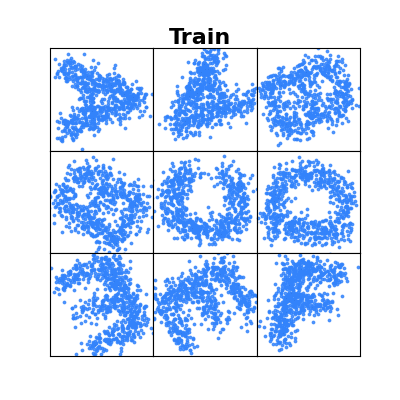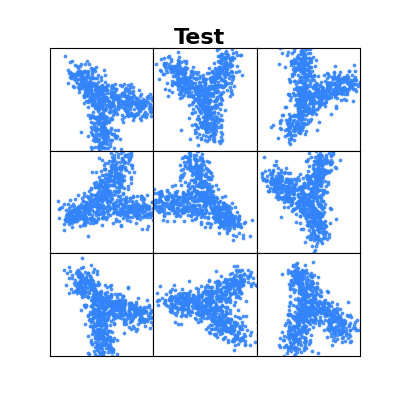Meta Flow Matching (MFM) is a practical approach to integrating along vector fields on the Wasserstein manifold by amortizing the flow model over the initial distributions. Current flow-based models are limited to a single initial distribution/population and a set of predefined conditions which describe different dynamics.
In natural sciences, multiple processes can be represented as vector fields on the Wasserstein manifold of probability densities - i.e. the change of the population at any moment in time depends on the population itself due to the interactions between samples/particles. One domain of applications is personalized medicine, where the development of diseases and the respective effect/response of treatments depend on the microenvironment of cells specific to each patient.
In MFM, we jointly train a vector field model
This repo contains all elements needed to reproduce our results. See this http link for the paper.
The preprocessed data can be downloaded here: Preprocessed organoid data
The raw data can be downloaded here: Raw organoid data. For usability, we provide the notebook trellis_data.ipynb which contains further dataset details and code for the data preprocessing.
If you find this code useful in your research, please cite the following paper (expand for BibTeX):
L. Atanackovic*, X. Zhang*, B. Amos, M. Blanchette, L.J. Lee, Y. Bengio, A. Tong, K. Neklyudov. Meta Flow Matching: Integrating Vector Fields on the Wasserstein Manifold, 2024.
@article{atanackovic2024meta,
title={Meta Flow Matching: Integrating Vector Fields on the Wasserstein Manifold},
author={Lazar Atanackovic and Xi Zhang and Brandon Amos and Mathieu Blanchette and Leo J. Lee and Yoshua Bengio and Alexander Tong and Kirill Neklyudov},
year={2024},
eprint={2408.14608},
archivePrefix={arXiv},
}Install dependencies
# clone project
git clone https://github.com/lazaratan/meta-flow-matching.git
cd meta-flow-matching
# [OPTIONAL] create conda environment
conda create -n mfm python=3.9
conda activate mfm
# install pytorch according to instructions
# https://pytorch.org/get-started/
# install requirements
pip install -r requirements.txtTrain model with chosen experiment configuration from src.conf/experiment/
python train.py experiment=experiment_name.yamlYou can override any parameter from command line like this
python train.py experiment=experiment_name.yaml trainer.max_epochs=1234 seed=42To train a model via MFM on the synthetic letters setting, use
python train.py experiment=letters_mfm.yamlTo run the biological experiments, first download the preprocessed data here. Then, similar to the synthetic letters experiment, executing
python train.py experiment=trellis_mfm.yamlwill train 1 seed of an MFM model on the organoid drug-screen dataset.
To replicate an experiment, for example, the last row of Table 1 (in the paper), you can use the multi-run feature:
python train.py -m experiment=letters_mfm.yaml seed=1,2,3Have a question? Found a bug? Missing a specific feature? Feel free to file a new issue, discussion or PR with respective title and description.
Before making an issue, please verify that:
- The problem still exists on the current
mainbranch. - Your python dependencies are updated to recent versions.
Suggestions for improvements are always welcome!








